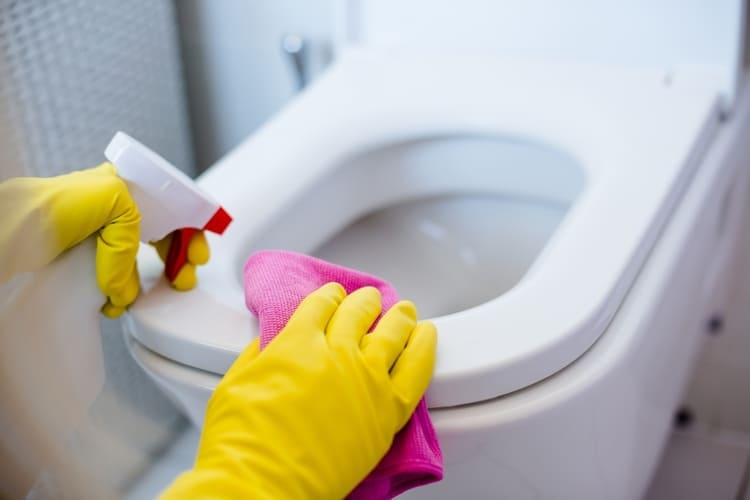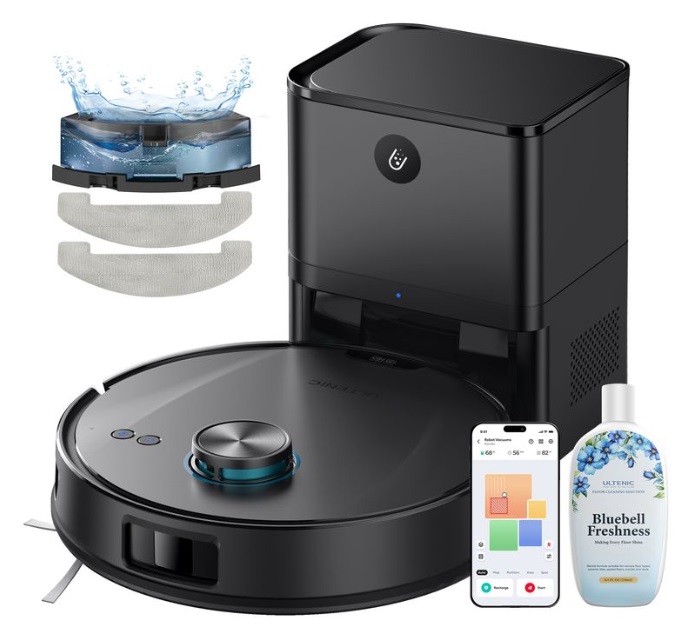Jasmine Birtles
Your money-making expert. Financial journalist, TV and radio personality.


Did you know that 10.6 million adults don’t spring clean their homes? According to cleaning brand Zoflora, 1 in 10 Brits admit they only do a clean if it’s to benefit visitors. One third will prefer a quick and speedy clean instead of a deep clean, which stacks up with the 40% of people who choose to clean as a way to relax and enjoy their environment.
However, spring cleaning can seem to come with extra cost – especially at a time of rocketing cost of living prices everywhere and no sign of economic instability from settling down thanks to international tariffs hitting the news lately.
We’ve put together our top tips to help you make the most of a deep spring clean to help boost your enjoyment of your home on a budget.


An effective way to cut down on cleaning costs is by making the most of your dishwasher. Only run the dishwasher when it’s fully loaded to conserve water and energy, which reduces utility bills. Using energy-efficient settings or eco modes can further decrease electricity consumption. Instead of buying pricey dishwasher detergents, you can make a homemade cleaner using common household items like baking soda and vinegar. Regular maintenance, such as cleaning the filters and checking the spray arms, ensures your dishwasher operates efficiently and lasts longer, saving you money on repairs or replacements in the long run. If you’re planning to add a dishwasher to your kitchen, a quick Google search for something like “dishwasher nz” should give you a list of options that you can check out.
The Hoover Cordless Vacuum Cleaner with CORNER GENIE™ is a phenomenal vacuum cleaner, and we never thought we’d say this but we actually enjoy doing the hoovering now! The innovative nozzle allows effortless manoeuvring and reaches hard-to-reach places, the flat shape cleaning under furniture with ease. We’ve cleaned places in our home we’ve never even seen before.

It’s so easy and quick to empty too, via a quick-release pedal, and there’s an LED display showing battery level and mode selection (normal/turbo) at the touch of a button: the removable battery allows 30 minutes of runtime (10 minutes in turbo mode).
The stick vacuum cleaner can be stored hanging & standing, and there are a ton of accessories including the motorised mini power nozzle, which is perfect for pet hair and fur. There’s a flexible crevice nozzle, a 2-in-1 dust & furniture attachment, a handheld vacuum container, and a wall mount with screws and instruction manual. Or you can just store this sitting upright in your cupboard or stand it in the corner.
The Henry Quick is a nifty stick hoover with one-click, dust-free emptying: includes 6 Pods that you just pop into the machine for factory-fresh performance and powerful suction, time after time. A powerful airflow compacts dust for more capacity than other leading vacuums, and what’s more the Pods are climate positive and made from recycled material: Hoover as carbon offsetting their pods globally, reducing carbon impact.

It has a really good power and runtime, this one: 25.2V for a runtime of 70 min Low / 16 min High; a charge time of 150 mins – 100%, and a litre pod capacity.
The amazing Hoover Robot Vacuum Cleaner HG4 has a rotating brush uses a combination of bristles and rubber blades to pick up dust and dirt from all types of flooring, whilst the side brush sweeps corners and edges. Suction power of up to 4000 Pa pulls the dust and debris up into the robot’s dust chamber, leaving your floors clean.

Download the HG Robot app to control your HG4 from anywhere, even when you’re not at home. You’ll be able to create the first map of your home in under 10 minutes, then you can personalise it to suit your needs. Give a name to each room, split or merge them, add no-go areas or virtual walls in places where you don’t want the robot to clean.
 The T20 Pro builds on Ultenic’s reputation for delivering high-performance cleaning technology at accessible price points, combining an ultra-powerful 8,000 Pa industrial-grade suction system, 99.2% effective debris pickup, AI LiDAR-based navigation, self-emptying capabilities, and integrated mopping all in one sleek device. The T20 Pro is available from Amazon for £359.99 (currently £289.99) and Ultenic for £309.99 (currently £60 off).
The T20 Pro builds on Ultenic’s reputation for delivering high-performance cleaning technology at accessible price points, combining an ultra-powerful 8,000 Pa industrial-grade suction system, 99.2% effective debris pickup, AI LiDAR-based navigation, self-emptying capabilities, and integrated mopping all in one sleek device. The T20 Pro is available from Amazon for £359.99 (currently £289.99) and Ultenic for £309.99 (currently £60 off).
Designed to cater to modern households, especially busy families, pet owners, and tech-savvy professionals, the Ultenic T20 Pro offers users a comprehensive cleaning solution that dramatically reduces the time, effort, and attention needed to maintain spotless floors.
It has an industry-leading 8,000 Pa suction power, an advanced self-emptying dustbin and LiDAR smart navigation with dynamic path planning.
We’ve got a couple of great recommendations for washing lines, whether you have a garden, a yard, or a corner somewhere to hang your laundry. We know wet laundry can dominate the house and garden, particularly if you have a family.
The Vileda Cordomatic – 15 metre retractable washing line is a great space-saving washing line. The wall mountable unit has 15 metres of retractable line which can be locked at any length. Once used, the line can be put back in to the unit so it doesn’t get in the way, and it’s a very sturdy product that easily holds up to 15kg of laundry.

The Vileda Viva Air 45m 4 Arm Rotary Dryer might give you some childhood nostalgia, as it’s reminiscent of the one your folks used to use to hang piles of laundry in a compact space. With a line length of 45m, the dryer can easily hold 4 loads of washing. The lightweight steel 4 arm rotary dryer comes with a split pole, so it can be transported with ease, and assembled quickly before installation.
Where do you start with furniture cleaners? We’d recommend the VAX SpotWash Max Pet-Design to clean, revive and restore your home, car and pet-loved areas. This powerful SpotWasher with 30% more suction power than other products, combined with the SpinScrub Hand tool gives the best cleaning results when tackling stubborn pet messes and household spills and stains. Heavy-traffic areas can be harder to keep clean, but VAX SpotWash Max Pet-Design’s powerful extraction and double the tank capacity make cleaning mud-trodden and rain-soaked spaces easy.
Interchangeable tools make tackling any surface hassle-free. The dedicated Messy Clean Up Tool is ideal for pets, allowing you to deep clean without any cross-contamination, the Crevice Tool reaches tight spaces and the Wide Path Tool cleans carpets and upholstery faster.
This is an expense but air purifiers are far more affordable these days, with the ones from Levoit coming in a range of sizes starting at a personal size for just £49.99. Air purifiers are ideal for improving your environment over the long term, as they filter dust, pollen, and pet dander from the air – meaning less dust for you to clean! And they are perfect for anyone who suffers from allergies, too.
Sometimes elbow grease won’t quite do the job on its own. There are a wide range of specific scrubbers and cleaners available on the market that help take the hard work out of housework. You can go old school with manual brushes like the Lakeland Natural Cleaning Brush Set, which will get into all the nooks and crannies with ease. Or, take the effort away with the Lakeland Electric Cordless Scrubber for easy cleaning almost everywhere.
Hot soap and water will get you a long way, but sometimes you need something for a particular job. Bar Keepers Friend Power Cream is ideal for grease, grime, and even limescale – it’s a TikTok sensation for being one of those miracle products that can get things clean you thought would never shine again.
Most people will try to ignore that their oven hasn’t had a deep clean in months (or years). But burnt on grease can become smelly, make your oven inefficient, and in worst case cause a fire hazard. It’s a fiddly job, unless you use something like the Oven Mate Deep Clean Kit, which has everything you need to get a professional level clean at home.
Zoflora is a recognised household name, and for good reason. We particularly like the Springtime Trigger Spray multipurpose cleaner and the Springtime Wipes are efficient and smell great. The Carpet Foam is ideal for stubborn odours and some stains, while the concentrated disinfectant cleaner offers brilliant value for money as you dilute it in a bucket for floors or pop into a spray bottle; it’s currently £4.32 on Amazon and dilutes at a 1:40 ratio so a real bargain.

Great guide! Regular and proper cleaning not only keeps your space looking fresh but also helps maintain a healthy environment. For those in Dubai looking for professional assistance, Cleaning-servicesdubai.com offers a wide range of reliable and affordable cleaning solutions tailored to both homes and businesses. Highly recommend checking them out for stress-free cleaning support!